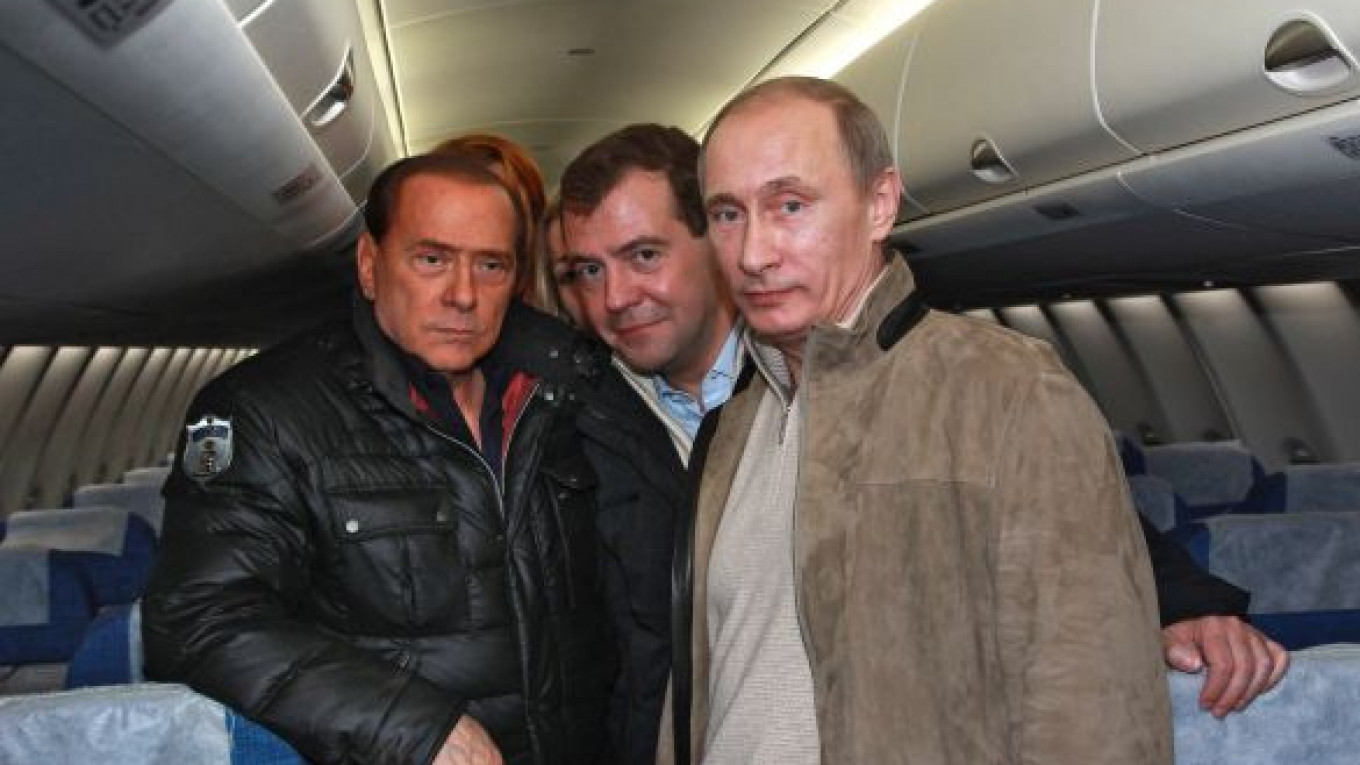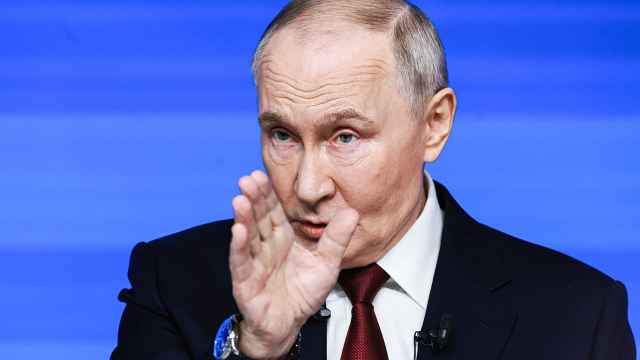Italian Prime Minister Silvio Berlusconi rejected claims in a U.S. diplomatic cable that he profits from close relations with Moscow, declaring as he stood next to President Dmitry Medvedev on Friday that the two leaders act only in the interests of their people.
Memos from the U.S. Embassy in Rome, released earlier in the week by WikiLeaks, alleged an uncomfortably close relationship between Berlusconi and Prime Minister Vladimir Putin. One cable suggests that the friendship between the two is so strong and Italy's dependence on Russian energy so significant that Berlusconi has a "distorted" view of Moscow.
Another memo claims that meetings between Berlusconi and Putin include the exchange of lavish gifts and that Berlusconi and his allies are believed to be personally profiting from Italy's extensive energy contracts with Russia.
After Berlusconi's talks with Medvedev, Putin joined them in the mountain resort of Krasnaya Polyana. They dined together and later inspected a Russian-built SuperJet at the Sochi airport before Berlusconi flew home.
"There has never been a single personal interest. We have always worked in the interest of our respective countries," Berlusconi told a news conference Friday.
Medvedev in turn did not comment on the specific claims about Berlusconi, but said the tranche of cables released by WikiLeaks — many of which have contained acid criticism of Russia — "show the full measure of cynicism in the assessments and conclusions that prevail in the foreign policy of various states, and I mean the U.S."
Then he appeared to try to leaven that sharp criticism by joking that Russian diplomatic cables also contain unflattering characterizations of U.S. policies, diplomats and leaders.
"If, God forbid, mass media learned certain assessments made by Russia's Foreign Ministry or special services, including [the assessments] of our U.S. partners, they'd have a whole lot of fun too," he said.
At the meeting, Russia and Italy agreed on holding joint military exercises next year and signed a partnership memorandum between Italy's Enel utility and Russian power trader Inter.
Putin and Berlusconi have long enjoyed a close friendship, with frequent visits to each other. Berlusconi has often defended Putin from critics who say the Russian prime minister is not fully committed to democracy.
The cables show that such strong ties have come under U.S. scrutiny.
One of the most critical cables from the U.S. Embassy in Rome says Berlusconi "appears increasingly to be the mouthpiece of Putin."
"His overwhelming desire is to remain in Putin's good graces and he has frequently voiced opinions and declarations passed to him directly by Putin," the communique says.
In part, the cable says, that reflects Italy's reliance on Russian gas. The energy-hungry country imports about nine times more gas than it produces, and Russia supplies about 40 percent of that.
"The quest for stable energy supplies from Russia frequently forces Italy to compromise on security and political issues," it says. Such apparent compromises include support for "Medvedev's plans to redefine European security architecture to undermine the OSCE and NATO" and Italian opposition to NATO efforts to improve ties with Georgia and Ukraine, the cable says.
But the report also suggests Berlusconi is emotionally and financially enriched by close relations with Russia. Berlusconi is believed to "admire Putin's macho, decisive and authoritarian governing style, which the Italian PM believes matches his own," the cable said.
In addition, the cable says contacts from within Berlusconi's party and from an opposition party "hinted at a more nefarious connection. They believe that Berlusconi and his cronies are profiting personally and handsomely from many of the energy deals between Italy and Russia."
Another cable from the U.S. Embassy dated October 2009 said Berlusconi chose "private fun over statecraft" when he decided to skip an event with the visiting Jordanian king ahead of his trip to Russia to celebrate Putin's birthday.
Berlusconi gave the impression that "he was husbanding his flagging energies for a blow-out party at Putin's private dacha," said the cable by U.S. Ambassador to Italy David Thorne.
Berlusconi has been dismissive of the cables. He said Friday that diplomats often based their memos on local news reports in an effort to appear well-informed in the eyes of their superiors, and therefore "we shouldn't attach to much importance" to them.
Still, he acknowledged for the first time, assessments in the cables were "certainly annoying."
The 74-year-old Italian has also been the subject of many other U.S. diplomatic cables, some touching on the scandals that have engulfed the premier's private life, amid reports of parties with young girls and allegations of encounters with a prostitute. He has denied taking part in any "wild parties."
A Message from The Moscow Times:
Dear readers,
We are facing unprecedented challenges. Russia's Prosecutor General's Office has designated The Moscow Times as an "undesirable" organization, criminalizing our work and putting our staff at risk of prosecution. This follows our earlier unjust labeling as a "foreign agent."
These actions are direct attempts to silence independent journalism in Russia. The authorities claim our work "discredits the decisions of the Russian leadership." We see things differently: we strive to provide accurate, unbiased reporting on Russia.
We, the journalists of The Moscow Times, refuse to be silenced. But to continue our work, we need your help.
Your support, no matter how small, makes a world of difference. If you can, please support us monthly starting from just $2. It's quick to set up, and every contribution makes a significant impact.
By supporting The Moscow Times, you're defending open, independent journalism in the face of repression. Thank you for standing with us.
Remind me later.






